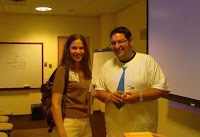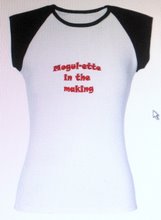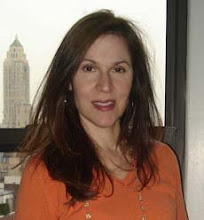By the time I got to my first session at Social Media Camp, the one-day event at Sun Microsystems on Thursday, Joshua Mack, VP of Network for Outside.in was wrapping up his schpeel on "place blogging", a term I had never heard before (other cool lingo I picked up that day: failwhale - what you get when the Twitter server is busy...). Their software allows you to enter a zip code and track blog conversations people are having in your local area. Very cool.
Twitter was the big theme of the day at this social symposium, and the next session I attended was a case study on how a business uses it. It was led by Saul Colt, Head of Magic at a company called FreshBooks (man, I wish I had a job title like that in my resume!). Saul (that's him with me in the picture below) is obsessed with Twitter and spoke for an hour on how he uses it for the company he works for, which makes online invoicing and billing software. Actually what he does is the opposite of business, because his "tweets", or the messages he sends on Twitter, have absolutely nothing to do with business. For example, he'll send a tweet in support of fellow Twitter-ers if they share a disappointing experience.
he'll send a tweet in support of fellow Twitter-ers if they share a disappointing experience.
Saul believes that we must use the internet to have real-world relationships with people, and twitter-ing is a way to do that. It used to be we knew everything about what was going on with the people in our community, like who had a baby, who went to what school, who was going where on Saturday night, etc. Somehow that got lost as society evolved, but the web is enabling us to find a way back there.
Saul pointed out that he gets 70% of his business from Twitter but says you can't track the effectiveness of word-of-mouth marketing in traditional ways. So he takes out all the things you can track, like promo codes, etc. and the rest is WOM. His last two cents: "Make people feel they're part of something special. Never pitch product - if it's good it will sell itself." Saul's quotable quote: the 4 E's - "execute on extraordinary experiences every day - that's what people will talk about."
From there I moved on to a fascinating discussion given by Loretta Donovan. Her session was titled "Customers, Clients and Social Mediators, When the Wiki Becomes CoLaboratory" (note: the spelling of the last word is intentional). Just in case you're fuzzy on what a wiki is, Wikipedia defines it as "a collection of web pages designed to enable anyone who accesses it to contribute or modify content." This makes for interesting collaborations between employees inside an organization (many of these are private), or anyone within an industry that wants to share knowledge about a specific subject. Loretta took us through the 3 main elements that wikis must have to be effective:
1-Knowledge - meaning information, and to this she suggests adding tags and allowing comments.
2-Integration - with more knowledge, for example, adding links to video or other sources that contribute to your premise. You can add a new page allowing contributors to continuously add and edit information, insert links back to other pages of the wiki, and raise questions that can be answered by other contributors - all this creates quantity.
3-Execution - this is the experimentation phase. Here you can create a prototype of something and then test it, and write about the results of the first test, and the second test, and the third, and so on, always allowing for people to leave comments.
Loretta added that wikis leave a visible path of how our thinking is going. They create a level of transparency for organizations, and a sense of psychological safety among employees - and where people feel safe, creativity abounds.
In the end, however, you need to sustain it. There are many wikis that are started and then forgotten, so you need to have a social mediator in charge of attracting those conversations to keep it going.
Next stop: Howard Greenstein's, interactive session on Twitter, where he posed the question, "how do you use Twitter for business?" to the group. These were some of the responses:
- as a source of news & information
- to participate in the community - answer questions and ask questions
- to alert your community about upcoming events
- to follow interesting writers/conversations
- to send out a daily tip
- to meet like-minded individuals and connect with them locally or when you travel
- to promote awareness of a particular issue
- to offer what you have













5 comments:
Great notes. Thanks for sharing, Carmina.
Carmina,
I am jazzed that you thought enough of my presentation to include me in your recap....THANKS!
Saul Colt
Head of Magic
FreshBooks
Thanks Carmina! I'll be looking forward to the post about Twitter.
great post Carmina, makes me wish I was there!
thanks for the article, i've been trying to figure out just why everyone is so crazy about twitter!
www.alexladydesigns.etsy.com
Post a Comment